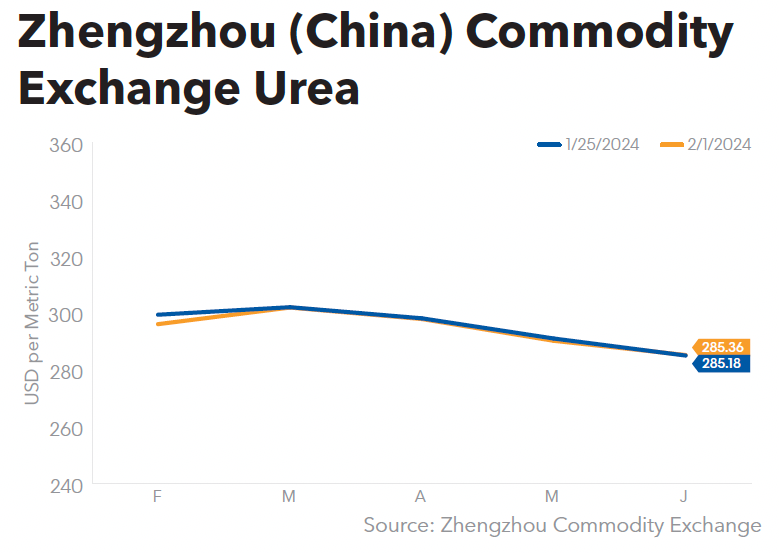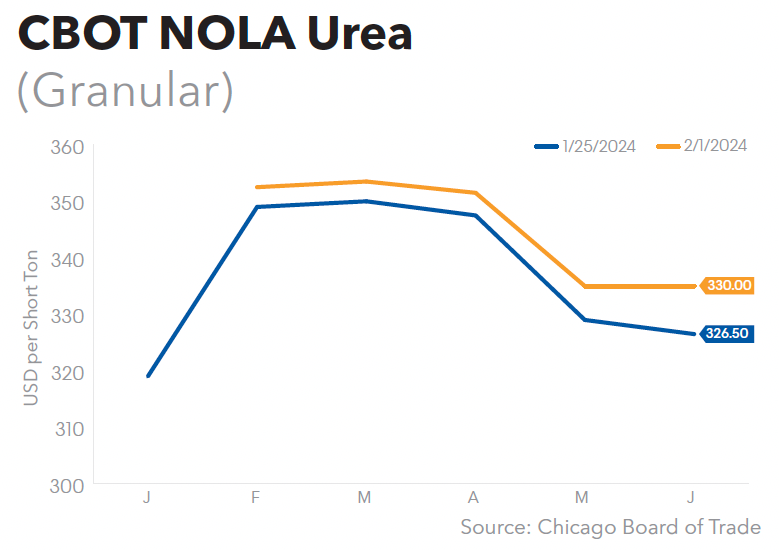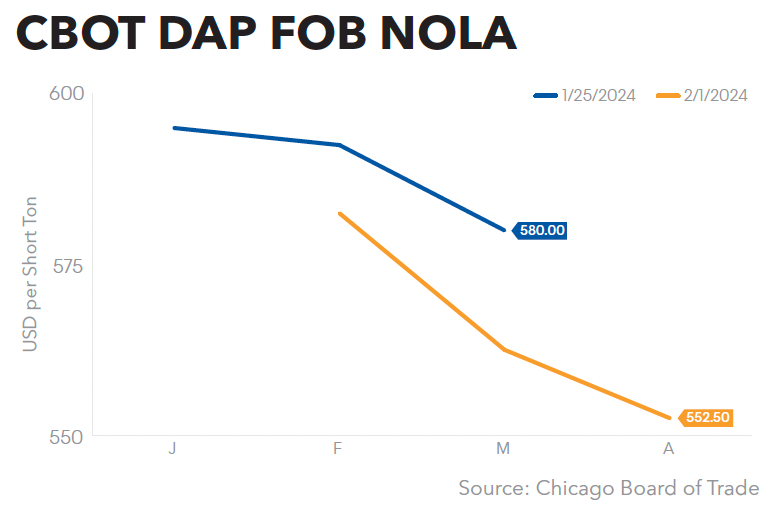Fertilizer Futures



The US EPA on Jan. 24 issued permits that allow Wabash Carbon Services LLC to construct two wells for the eventual injection and permanent storage of carbon dioxide underground, one at a site in Vermillion County and another in Vigo County, Ind.
These underground injection wells will be used to store carbon dioxide captured from Wabash Valley Resources LLC’s (WVR) planned $1.2 billion, 500,000 mt/y fertilizer plant near West Terre Haute, Ind.
“After a thorough technical review and engagement with the public, including consideration of over 1,000 public comments, EPA has determined that the two proposed wells meet public health and safety requirements to move forward,” said EPA Region 5 Administrator Debra Shore.
Wabash Carbon Services plans to inject up to 1.67 million mt/y of carbon dioxide into the wells over an injection period of 12 years. In 2021, WVR selected Honeywell, Des Plaines, Ill., to provide a range of its Honeywell UOP technologies to help capture and sequester the carbon.
Plans for the ammonia project date back to 2016 (GM May 20, 2016), when Phibro LLC, Stamford, Conn., announced that its affiliate, Philipp Brothers Fertilizer, together with a group of investors, had acquired SG Solutions’ Gasification Plant. Phibro planned to convert the clean coal gasification plant into ammonia production. Originally, the plant used coal and petroleum coke, and at last report the plan was to use petcoke and biomass for the new production. It will also generate electricity.
WVR
said the project will displace half of the imported ammonia supply to Illinois,
Indiana, and Ohio and would put downward pressure on prices. It said it will
add more than 1,100 direct and indirect jobs, including the creation of up to
500 union construction jobs at peak employment, and add over 100 permanent jobs
at the facility.
Iowa State Auditor Rob Sand (D) on Jan. 30 sent a letter to the Federal Trade Commission and the US Department of Justice seeking to block OCI Global’s $3.6 billion sale of its Iowa Fertilizer Co. plant in Wever, Iowa, to Koch Industries Inc. (GM Dec. 22, 2023). A group of 18 agriculture and environmental groups sent a similar letter on Jan. 22 (GM Jan. 26, p. 1).
Sand said the project received more than $500 million in local, state, and federal funds and was pitched to Iowa taxpayers as a project that would encourage competition in a heavily consolidated industry.
“Less than a decade later, OCI Global is cashing out, with Koch Industries seeking to reap the benefits by buying the plant,” Sand said in the letter. “But the fact that it wouldn’t be owned by Koch was a justification for the massive commitment of tax dollars in the first place.”
“If this acquisition by Koch Industries is allowed to proceed, the cost of fertilizer to farmers will likely increase due to further industry consolidation,” he continued. “That hurts Iowa producers. It also negates the original intent of the deal that OCI Global reached with Iowa taxpayers to increase competition in the industry.”
To date, Sand is the only Iowa statewide official to speak out against the deal. He is also the only statewide official that is a Democrat and he is seen as a possible future candidate for governor.
“Reneging on a deal may not seem like a big deal to a big corporate entity like OCI or Koch Industries, but for most Iowans, our word is our bond,” he added. “In 2013, promoting the largest tax incentive package in Iowa history, Governor Branstad said, ‘the Koch Brothers don’t want the competition […] We want competition.’ I agree with the former governor. This deal should be rejected.”
India will cut its fertilizer subsidy in the new fiscal year from April 1 as global prices weaken and the government looks to prune its budget deficit, according to a Bloomberg report. The country will slash the allocation to 1.64 trillion rupees ($19.8 billion) in 2024-25, down from 1.89 trillion rupees for the current fiscal year.
Finance Minister Nirmala Sitharaman made the announcement in her interim budget speech in Parliament on Feb. 1.
The reduced spend will help India trim its budget deficit but could pose challenges for the government trying to manage food inflation. India uses the subsidy to reimburse companies for selling fertilizer to farmers at below-market prices. If cultivators have to bear higher costs, they might trim the use of crop nutrients, putting the country’s food security at risk.
India’s budget deficit is projected to be 5.8% of gross domestic product in 2023/24. The government aims to curb the deficit to 5.1% in the next financial year.
Shares of Indian fertilizer producers fell on concerns that a reduction in subsidies will cut fertilizer consumption. National Fertilizers Ltd. slid as much as 5.1% in Mumbai, Rashtriya Chemicals & Fertilizers Ltd. declined as much as 4.7%, while Chambal Fertilisers and Chemicals Ltd. fell 1.4%.
German rail freight and passenger services have resumed after train drivers from the Gewerkschaft Deutscher Lokomotivführer (GDL) union and state-owned rail operator Deutsche Bahn AG resumed negotiations.
The strike had been set to last six days and end on Jan. 29 (GM Jan. 26, p. 1). Freight services resumed on Jan. 28 at 6 p.m. local time while passenger services restarted on Jan. 29 at 2 a.m. GDL members have agreed to not stage another walkout until at least March 3, according to a Deutsche Bahn statement cited by Bloomberg.
Had it run its full course, the strike would have been the longest in Deutsche Bahn’s history. The country’s BDI industry lobby had warned that a six-day strike could lead to losses to the German economy of as much as €1 billion (approximately $1.1 at current exchange rates) and cause “enormous problems” for companies, particularly in the chemical, steel, automotive, paper, and timber sectors.
K+S Group confirmed to Green Markets last week that the strikes were affecting the company as Deutsche Bahn is its main rail contractor, but K+S had been able to conduct some transports and/or was able to use other rail companies, or shift to truck transports.
German chemical giant BASF SE, according to a Dow Jones report, was forced to shift railway transports on “a large scale” to trucks as a result of the strike. In normal circumstances, BASF handles about 30% of its transports by rail.
Tensions had escalated after the small but powerful GDL union rejected a third offer from Deutsche Bahn, which reportedly included a €1,500 inflation-adjustment bonus that could be paid in March, according to the report. Base pay as well as reduced working hours are being negotiated. A key demand of the union is a 35-hour work week on full pay, down from the current 38 hours.
“Deutsche Bahn’s willingness to negotiate a reduction in working hours is of central importance,” said GDL Chairman Claus Weselsky, according to the report. “If an agreement is reached, this would be a strong signal for the entire railroad system.”
In other labor news, Finland’s Industrial Union announced new political strikes to take place on Feb. 14-16 involving 60,000 industrial workers, with a large part of the country’s industry expected to come to a “standstill,” according to Bloomberg, citing a statement from the union.
The new action follows this week’s strikes of 200,000 workers opposing the government’s plans to reform the labor market and some benefits. Fertilizer producers Kemira and Yara International ASA are included on the list of affected companies.
Other industrials on the list include ABB, Andritz, BASF, Boliden, Caverion, Enersense, Fiskars, Harvia, Kesla, Kone, Konecranes, Marimekko, Metso, Nokia, Nokian Renkaat, Orion, Outokumpu, Ponsse, Sandvik, Scanfil, SSAB, Stora Enso, UPM-Kymmene, Uponor, Vaisala, Valmet, and Wartsila.
Brazil and Bolivia have signed a Memorandum of Understanding (MOU) to undertake studies on potentially building new fertilizer plants in both countries, according to an Agência Brasil report on Jan. 30, citing Brazil’s Agriculture Ministry.
The two countries inked agreements to study new plants to produce nitrogen, phosphate, and potash fertilizers, the Brazilian ministry said in a statement. The deal should help reduce Brazil’s dependence on imported fertilizers, said Minister of Agriculture, Livestock and Food Supply Carlos Fávaro.
Alternatives need to be created, one of which is the supply of natural gas at more competitive prices, the report also cited the minister as stating. Bolivia is one of Brazil’s key suppliers of natural gas.
The MOU follows reports from last autumn citing Bolivia’s Hydrocarbons and Energy Minister Franklin Molina that Brazil’s government was seeking to invest in new fertilizer projects in Bolivia that would produce nitrogen fertilizers, including urea, as well as potash and phosphates (GM Sept. 8, 2023).
Brazil’s state-owned oil and gas group Petróleo Brasileiro’s SA (Petrobras) and Bolivia’s Yacimientos Petroliferos Fiscales Bolivianos (YPFB) in October were also reported to be in talks about a possible joint investment to build an ammonia and urea plant in Puerto Quijarro, on the Brazil-Bolivia border (GM Oct. 27, 2023). Petrobras cautioned at the time that no final investment decision had been made.
Brazil is already the main customer of Bolivia’s only urea plant, Marcelo Quiroga Santa Cruz (formerly known as Bulo Bulo), which has a nameplate capacity for 2,100 mt/d of granular urea.
According to the statement, Fávaro said Brazil also intends to compete its current fertilizer projects, including Petrobras’ nitrogen fertilizer Unit-III (UFN-III) project in Três Lagoas, in the state of Mato Grosso do Sul. The plant has a projected urea and ammonia production capacity of 3,600 m/d and 2,200 m/d, respectively.
Construction of the project was halted in December 2014 when work was about 81% complete. Petrobras then tried to sell the project, including two failed deals with Russia’s Acron Group (GM April 29, 2022).
Early last year, however, Fávaro indicated that Petrobras would resume construction of UFN-III as part of new President Luiz Inácio Lula da Silva’s push for Petrobras to play a broader role in the development of various public policies in Brazil, including fertilizer investments (GM Jan. 20, 2023).
The new agreements signed by Brazil and Bolivia will expire in five years but can be renewed, according to the statement, and are part of a proposed expansion of cooperation between the two countries. Ministers from the two governments on Jan. 30 also signed an MOU aimed at expanding cooperation in biofuels, biotechnology, and fertilizer trade.
The MOU is aimed at developing policies to determine prices for the fertilizer and biofuels industry in the two countries, according to a bnamericas report, citing a press release by Bolivia’s Ministry of Hydrocarbons and Energy. Technical visits, internships, training, symposiums, seminars, and other activities will also be undertaken related to fertilizers and biofuels.
Edward C. Dowling Jr. became the President and CEO of Compass Minerals, effective Jan. 18, 2024. He will continue as a member of the Board of Directors. Compass also announced the promotions of Jenny Hood to Chief Supply Chain Officer, and Ben Nichols to Chief Sales Officer.
Dowling brings more than 30 years of leadership experience and international mining expertise to the role. A former petty officer in the US Navy, he earned a Bachelor of Science in mining engineering and mineral processing, a Master of Science in mineral processing, and a Doctorate in mineral processing from Pennsylvania State University.
In her new role on the company’s senior management team (SMT), Hood will continue to lead the next-generation Fire Retardant business and will have oversight of the global supply chain function, including the customer experience, integrated business planning, logistics and procurement teams. Nichols, also joining the SMT, will now oversee the sales, product management and marketing functions for the company’s Salt and Plant Nutrition businesses.
Hood and Nichols have both held roles of increasing responsibility at the company. Hood was most recently Head of Fire Retardants and previously served as Vice President, Supply Chain. Nichols was most recently Vice President, Commercial, and previously served as Vice President, Plant Nutrition, and Vice President, Salt, Consumer, and Industrial.
Hood holds an Executive Master of Business Administration from Virginia Commonwealth University and a Bachelor of Arts in technical writing from Christopher Newport University. Nichols has a Bachelor of Science in management and marketing from Baker University and a Master of Business Administration from Pittsburg State University.
Additionally, Compass has appointed Jordan Taylor to Vice President, Operations, Utah. He is responsible for leading operations and strategy at the company’s Ogden, Utah, facility. Taylor has been with the company for more than four years and has served as Vice President, Lithium Operations, and Director, Engineering and Operational Support.
Prior to Compass, Taylor held several operations and engineering roles of increasing responsibility at companies such as Covia Corp., Anglo American, and BHP. Along with his 17 years of professional experience, he holds a Bachelor of Science in mining and minerals engineering from Virginia Tech. He is also a licensed professional engineer.
Junior miner American Potash Corp., Vancouver, B.C., on Jan. 30 announced that Jonathan George has stepped down as President and CEO. Dean Besserer, a Director of the company, has been appointed as Interim President and CEO.
The company said Besserer has more than two decades of mineral exploration experience, previously serving as Vice President and Partner at Apex Geoscience Ltd., a consulting firm, and as a Director of Brilliant Mining, Niblack Resources, and Sentosa Mining. He also served as the Vice President of Exploration of numerous junior mining companies and is a professional geologist and a qualified person as defined in National Instrument 43-101, Standards of Disclosure for Mineral Projects.
With this change in management, the company said it will be renewing efforts to explore its Green River Potash and Lithium Project within the Paradox Basin in Utah (GM Oct. 6, 2023). Located only 20 miles northwest of Moab, Utah, American Potash said the project has significant logistical advantages including proximity to major rail hubs, airport, roads, water, towns, and labor markets.
Polish energy group Orlen SA’s supervisory board this week dismissed company CEO Daniel Obajtek from the management board, effective at COB on Feb. 5, according to a company filing. Earlier in the week, Obajtek had placed himself at the disposal of the supervisory board.
In December, Poland’s new Minister of State Assets Borys Budka said he expected the speedy resignation of Obajtek as CEO of Orlen. The minister’s comments followed Obajtek’s public statement that he would stand down from the position in the event of a change of government. Poland started 2024 with a new government, with Donald Tusk’s Liberal progressive coalition replacing the Conservative PiS (Law and Justice) party that had ruled Poland for eight years.
Orlen in June last year signed a cooperation and non-disclosure agreement with Polish fertilizer and chemicals producer Grupa Azoty SA for the potential acquisition of Azoty’s Zakłady Azotowe Puławy subsidiary (GM June 9, 2023). However, Azoty in November reported it would start talks aimed at ending the potential takeover of Puławy (GM Nov. 22, 2023).